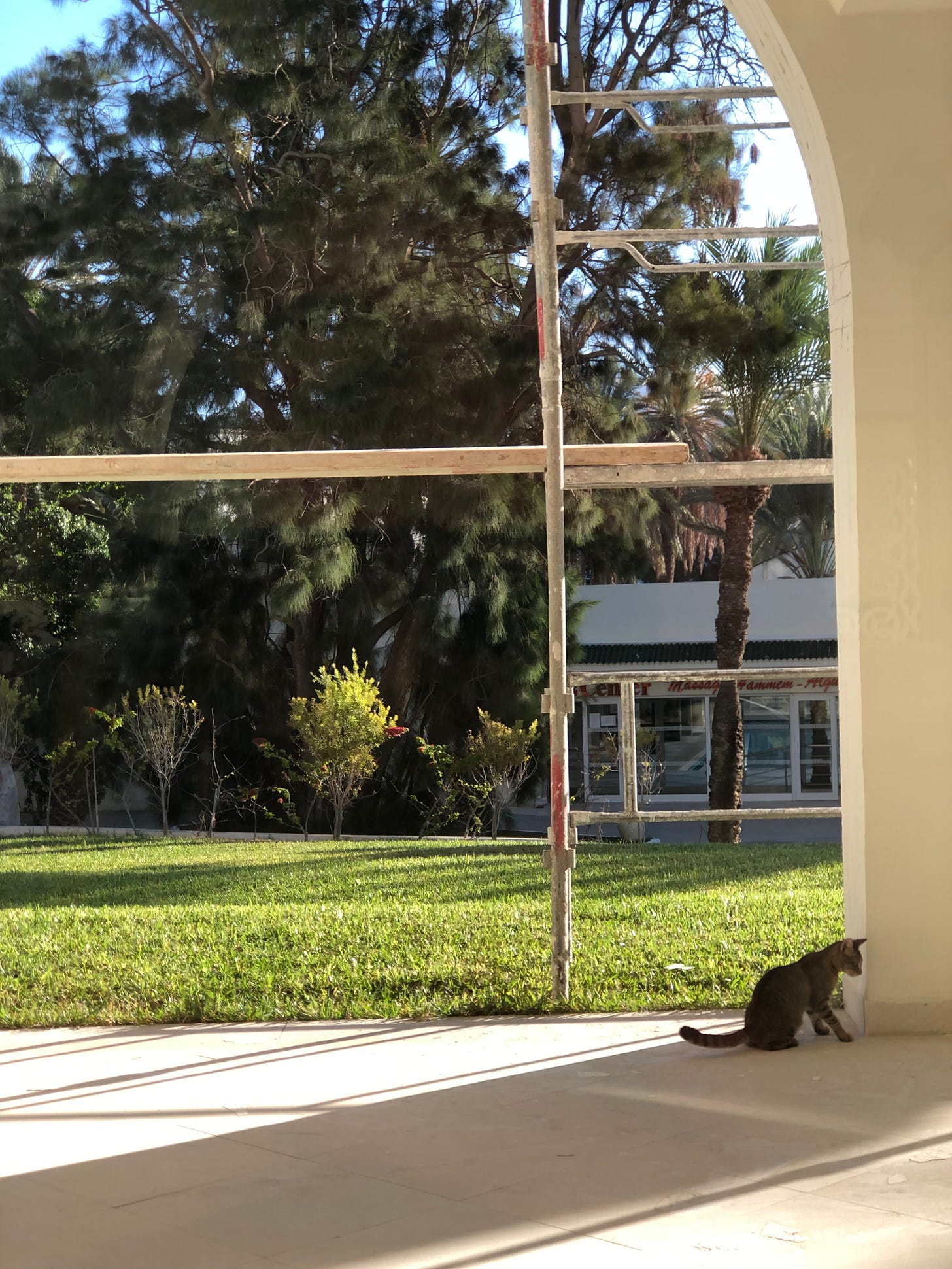Hello, reader.
This letter takes roughly five hours to write & edit & record each week. I’m currently saving any spare pennies & pounds I earn from it to study literature & enter short story competitions.
Please support me if you like what I do: subscribe (for free or a few quid), forward this letter to a friend, comment, or buy me a coffee, a book, PayPal me — we could also work together.
Thank you.
Hello,
Here are ten things I’d like to remember from this week.
one
For the next week, I’m in in Sousse, Tunisia.
I’ve brought a small selection of books with me, but I’m expecting the majority of what I share next week to be small reflections on my time here.
(Here’s what I brought: The Trees by Percival Everett (‘the funniest book about lynching ever written’ was the quote my friend Tina, manager of Hunting Raven Books & catsitter extraordinaire, had been handed by a friend), then three of the Penguin Classics Great Ideas series: The Myth of Sisyphus by Albert Camus, On the Suffering of the World by Arthur Schopenhaur, and How to be a Stoic by Epictetus, Seneca, and Marcus Aurelius. In hindsight, short story collections may have made better poolside reading, but I’ll make do — Everett’s chapters are super short, the Great Ideas are complex but diddy, plus I have audiobooks.)
two
This chapter opening from The Trees by Percival Everett reads like a standalone short story.
three
From The Colony by Audrey Magee (2022), which I finished last week.
[He] took the drawings to sit in front of the still stumbling fire. He lifted a bundle. Birds. Terns with heads that were too big, gulls with heads that were too small. He fed them to the fire, a surge of light and heat eradicating his early ignorance, his need for tuition by the island boy … He picked up more drawings … and threw sheet after sheet to the flames.
self-portrait: playing god
… He squeezed fresh paint onto his cleaned palette and painted over James, the boy no longer holding the rabbit and paintbrushes but four fish, two in each hand.
self-portrait: being god
four
Having recently finished an eight-week course of group behavioural therapy, to notice bad habits & introduce positive responses in my reactive life, I was pointed in the direction of meditation, which led me to the animated joy that is Headspace.
As I mentioned a while back about my newfound neurodiversity, I like how the app, in one animation, described meditation as a tool for the hypersensitive to become ‘unfazed and unruffled by whatever appears.’
five
A short listen — enjoy the moral at the end.
six
Q: I think I understand a producer’s role for a film or series: pulling everything together outside of the creative product being made — why, then, is a producer used as a selling point for some films: from the producers of This Film. Does it make it better, visually, for the viewer? Do production companies matter in the same way I find book publishing houses do? I’ll often read whatever a particular publisher of books puts out into the world, so do we get the same by monitoring companies in film: these groups of people who are paid to find other people to pay to create? Something I’ll ask someone from my previous employers: London Film School.
seven
This was an interesting article about the broader ecological benefit of allowing animals that die in the ocean & wash-up on the shore to be left as they are, in a role we wouldn’t ordinarily consider them to hold: providers.
Metaphors related to writing danced & jostled for attention on the tip of my tongue. I couldn’t settle on one that felt entirely right. Dead whales are considered key sources of food for hordes of other animals; our most accomplished authors’ work will inspire, feed, so many others — perhaps there’s something in being a well-fed creature, rather than forever wishing to be the whale itself.
eight
The ‘distinctive contribution’ of something is a phrase I like — from an article in Brixton Review of Books.
nine
I’m not an experienced reader of music criticism.
This article on Fleet Foxes is a great entry point for me to read this week.
I’ve long tried to explain (not that anyone asked) why I admire critics & what they do (when done well) so intensely — probably inspired in part by money spent on pretty, shitty books & dissatisfying, expensive trips to the cinema. Critics matter so much in culture because they (in theory) clear the way for better things to be created. I see it as a symbiotic relationship. Without critics, we wouldn’t have people initiating the conversations around things that other people make. We’d just be blindly told by streaming services or publishing houses that own the majority of all the stuff being created: this is what you want; need.
ten
This week, sat by the pool with nothing to do but sizzle, I’ll consider the tasks on my website’s to-do page — how I’d like it to capture things &, I imagine in greater measure, ask some to pause & others to leave entirely. It’s satisfying to have, I think because it reminds me that these are things I choose to do, not things expected of me.




